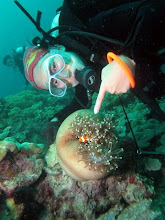
Over four thousand species of fish live in or around coral reefs – and for many of them, their life depends critically on the health of the corals
Climate change is likely to have significant impact on the world’s beautiful coral reef fishes and will increase the risk of fishery collapses, a new scientific study warns.
The report by researchers of the ARC Centre of Excellence for Coral Reef Studies in the international journal Fish and Fisheries says that the vulnerability of corals to climate change impacts also extends to the many species of fish which depend on coral reefs for food, shelter or reproduction.
“Over four thousand species of fish live in or around coral reefs – and for many of them, their life depends critically on the health of the corals,” says lead author Dr Philip Munday.
“We have already seen episodes of mass die-off of corals as a result of warmer waters associated with global warming. The problem for specialist coral fishes is that when the corals die, the fish have nowhere else to go. Other kinds of fish live more independently, but depend on reefs for shelter in the juvenile stage of their life.”
.jpg)
when corals die, the fish have nowhere else to go.
As coral communities become less healthy, so too do the fish communities. A loss of diversity in corals due to bleaching and other impacts is also likely to lead to a loss in diversity among the coral fishes which inhabit them, the researchers say.
Like the corals themselves, coral fishes appear to prefer a temperature-stable environment and heating of the water may affect them in unpredictable ways. For instance, he says, warmer water may lead to higher survival rates in baby fish – but it could equally send a signal to adults to stop breeding, as reproduction is often governed by water conditions. Recent research has shown that some species might grow more slowly if temperatures go above their preferred range.
“There are still many unknowns and uncertainties in this area, which has not so far been widely studied – but the bottom line is that managing coral reef fisheries on which people depend for their livelihoods to ensure they are sustainable is going to become a lot more challenging and uncertain,” Dr Munday says.
An estimated 200 million people worldwide derive their livelihoods and a major source of sustenance from coral reefs. In Australia a $5bn tourism industry depends significantly on visitors being able to view corals and their colourful fish.
The problem stems in part from the fact that when many coral fish breed, their eggs are swept out to sea, and the baby fish then swim back and resettle on the reef. If reefs have been extensively damaged or the composition of their corals altered due to global warming impacts, this process of re-stocking the reefs with fish may be disrupted. At the same time, the baby fish are likely to be affected by changes in water temperature and the acidification of the oceans
“It is very likely that some coral reef fish populations will migrate as the sea water becomes warmer in the higher latitudes. This may mean the appearance of tropical fishes in places which currently have few or none.
“However in the case of the Great Barrier Reef the problem is that there are no suitable shallow structures on which reefs can form off its southern end. This means there is really nowhere for coral reefs and their associated fish communities to expand. Effectively, this means that some coral reef fish species will be squeezed by rising water temperatures into smaller and smaller areas, making them more susceptible to disturbances such as coral bleaching and increasingly vulnerable to fishing and other forms of human activity.”
As to simply heading deeper, into cooler water, Dr Munday says that while coral reef fish do sometimes go deep, mostly they prefer the sunlit waters of the surface where the food supply is greatest, and tend to observe fairly strict depth boundaries.
“There are critical gaps in our understanding of how the tropical ocean will change over the coming century, especially at regional and local scales. There are even larger gaps in our understanding of how rapid changes in the ocean climate will affect reef fishes at the individual, population and community levels. These knowledge gaps introduce a high level of uncertainty to many of our assessments. Nevertheless, our synthesis identifies areas of major concern regarding the possible effects of climate change on coral reef fishes,” the authors of the paper say.
“Climate change and the future for coral reef fishes” appears in Fish and Fisheries 9 of 2008 and is co-authored by Dr Philip Munday, Professor Geoff Jones, Dr Morgan Pratchett and Dr Ashley Williams of CoECRS and James Cook University.
www.coralcoe.org.au
.jpg)
As coral communities become less healthy, so too do the fish communities. A loss of diversity in corals due to bleaching and other impacts is also likely to lead to a loss in diversity among the coral fishes which inhabit them, the researchers say
.jpg)




No comments:
Post a Comment